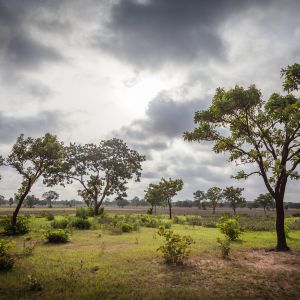This Toolkit is designed with inclusive language to ensure clarity and accessibility for all. Crowdsourced from members and organizations of the Coalition for Climate Education Policy, these resources have undergone rigorous evaluation to maintain high standards of quality and relevance.
Our Vision for This Toolkit
Our vision for this toolkit is to ensure it’s accessible to everyone, regardless of background or location. We recognize the diversity of climate conversations across the U.S. and understand that it’s more complex than a simple divide.
Explore our framing and objectives below, designed to help individuals engage with climate action, no matter where their community’s conversation lies. You will find two versions of the framing and objectives because we want to ensure the toolkit can be adapted to various perspectives and contexts.
Want to access a PDF version of the Toolkit framing and objectives? Click here.
Climate Supportive States
Toolkit Framing
This toolkit is designed to support anyone advocating for educational policies that emphasize:
- Climate Literacy and Action: Preparing students to be informed and engaged citizens in the face of changing climate patterns.
- Career Readiness & STEM Learning: Equipping the next generation with the knowledge and skills needed to be successful in green careers, particularly by boosting environmental engineering and applied STEM education to prepare students for high demand green careers in technology and innovation. By training the skilled workforce necessary, the state will better compete for and attract new industries, especially quality green jobs.
- Skill Development: Providing education that helps students learn soft skills such as collaboration, curiosity, and teamwork.
- Healthy and Just Learning Environments: Fostering healthy, inclusive, and just learning environments and school safety, and promoting student well-being, ensuring that educational settings are conducive to growth and development.
Toolkit Objectives
- Ensuring Equitable Access and Promoting Justice: Climate education policy change can range from updates in academic standards to legislative action at the state level. This toolkit aims to shed light on the broad array of successes in climate education policies within states, counties, and school districts, with a strong focus on leveraging climate education as a tool for promoting justice and ensuring equitable access to climate education resources.
- Empower Organizations and Advocates: Equip organizations, youth advocates, and Departments of Education with effective tools and resources to champion and drive climate education policies across all 50 states.
- Comprehensive Database: Serve as a comprehensive repository of openly accessible resources for individuals involved in crafting, advocating for, and implementing state and local climate education policies.
- Catalyzing Impact: Catalyze impactful change at the state and local level by highlighting the evolving landscape of climate education policy and fostering collaboration.
Contributors
We extend our gratitude to the many individuals and organizations who have thoughtfully contributed to this Toolkit.
The Writing Team including Colleen Norton, Jimena Cuenca, and Sarah Bodor.
Contributing Organizations include NAAEE, Action for the Climate Emergency, The Aspen Institute, Association of Science and Technology Centers, CLEAR Environmental, Climate Generation, Earth Echo International, Earth Day, The Hitchcock Center for the Environment, MAEOE, The National Caucus of Environmental Legislators, National Wildlife Federation, SubjectToClimate, Take Action Global, Ten Strands, The Education Trust, and Unbounded Associates.
Contributing Reviewers including the Coalition for Climate Education Policy, Ten Strands, Climate Generation, NAAEE Affiliates, and NAAEE eeAdvocates.
Climate Hesitant States
Toolkit Framing
This toolkit is designed to support anyone advocating for educational policies that emphasize:
- Efficiency and Waste Reduction: Prioritizing energy efficiency and the reduction of waste, which not only conserves resources but also saves costs for schools and taxpayers.
- Career Readiness & STEM Learning: Equipping the next generation with the knowledge and skills needed to find careers, particularly by boosting environmental engineering and applied STEM education to prepare students for high demand careers in technology and innovation. By training the skilled workforce necessary, the state will better compete for and attract new industries, especially quality green jobs.
- Skill Development: Provide education that helps students learn soft skills such as collaboration, curiosity, and teamwork.
- Healthy Learning Environments: Foster healthy learning environments and school safety, and promoting student well being.
- Showcase Policy Achievements: Highlight notable accomplishments in policies related to outdoor education and school sustainability within states, counties and school districts.
Toolkit Objectives
- Promote Fairness and Opportunity: Leverage sustainability to expand educational and professional opportunities for youth.
- Empower Organizations and Advocates: Provide effective tools to empower organizations and youth to champion environment and sustainability education policies in local communities across all 50 states
- Comprehensive Database: Serve as a comprehensive repository of openly accessible resources to support individuals involved in crafting, advocating for, and implementing school sustainability or environmental education policies.
- Catalyzing Impact: Catalyze impactful change at the state and local level by highlighting the evolving landscape of school sustainability and education policy.
How Resources Were Selected
The resources included in this toolkit were carefully selected and developed through a collaborative process. Many were crowdsourced from members and organizations within the Coalition for Climate Education Policy, while others were created by our members and underwent several feedback cycles to ensure their rigor and relevance.
This collaborative approach ensures that the toolkit reflects diverse perspectives and meets high standards, providing you with reliable and impactful tools for advancing climate education policy.




